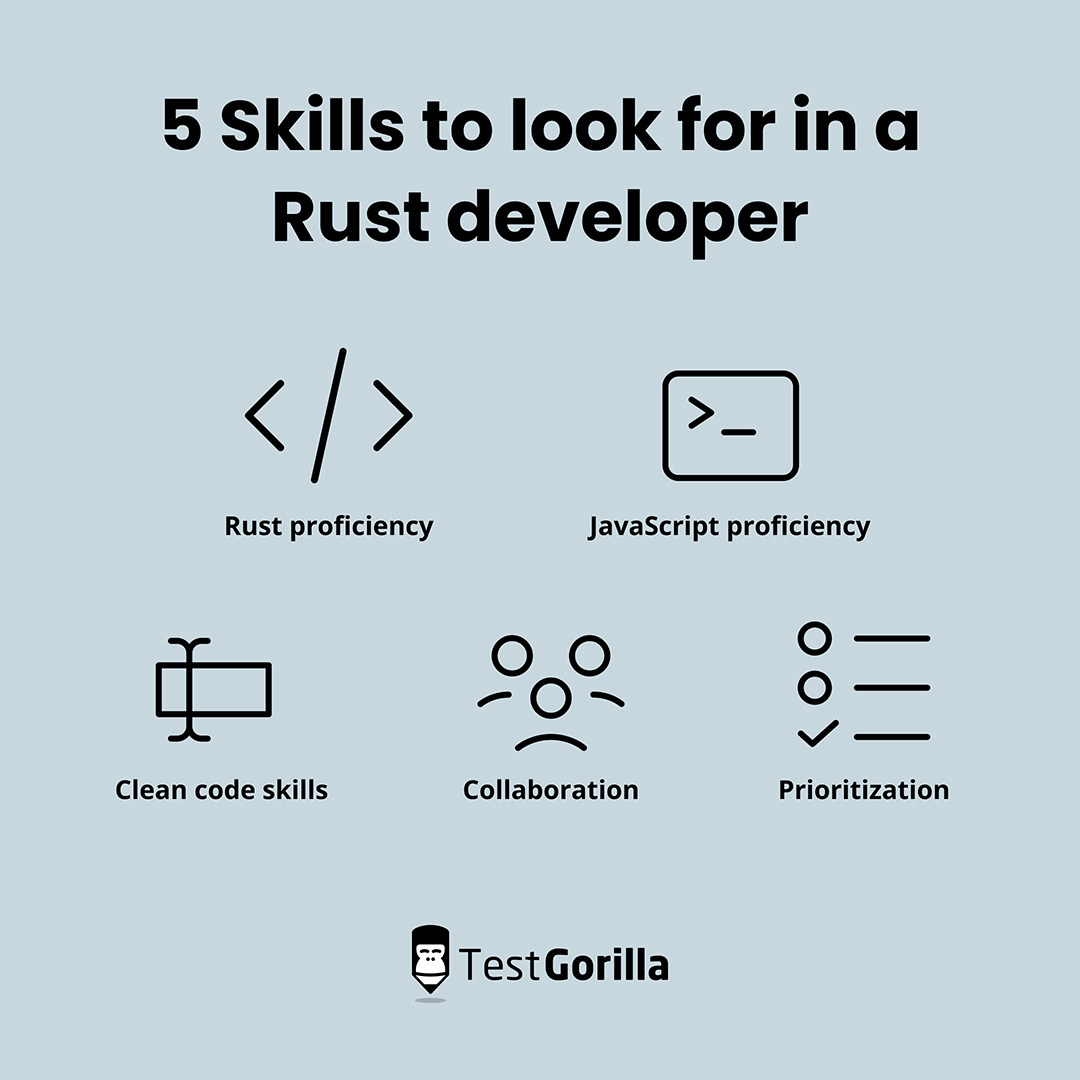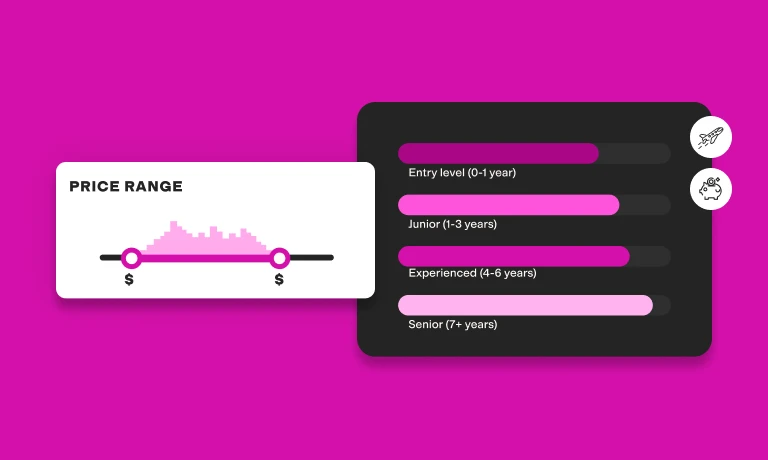Rust developers power your organization’s growth by building scalable and flexible software systems. You can hire a Rust developer to help you set up a custom operating system, launch a web app, build a game engine, or make your company’s backend systems more resilient.
Hiring the right candidate for your business is critical. A backend developer who isn’t proficient in Rust or doesn’t mesh well with your team can delay critical software deployments and hold back your company’s progress.
In this guide, we’ll explain how to hire the best Rust developer for your team.
Table of contents
- What you need to know before hiring a Rust developer
- Skills to look for in a Rust developer
- Where to find skilled Rust developers
- Creative ways to find Rust developer candidates
- How to select the best Rust developer candidates
- Common mistakes when hiring a Rust developer
- Hire the best Rust developer with TestGorilla
What you need to know before hiring a Rust developer
There are a few points to consider before starting the hiring process that will enable you to focus on the type of candidate you want to hire and help you write the perfect Rust developer job description.
Project type
The Rust programming language is commonly used for several different purposes, including building game engines, browsers, web apps, and even whole operating systems.
There’s a big difference between building a game engine and building an operating system. So, Rust developers who have worked on different types of projects in the past may have very different experiences and approaches to coding.
Think carefully about what projects you plan to have a Rust developer work on. Then tailor your search to focus on candidates who have experience with similar types of projects using Rust.
Project duration
Not every software project requires hiring a full-time, permanent Rust developer onto your team. For one-off or small projects, such as optimizing a web app using Rust, it might make sense to hire a part-time or freelance developer.
This can save you money in the long run if you don’t have enough work to keep a full-time Rust developer occupied. However, hiring a contractor means that you may need to go through the hiring process again if you have another project that involves Rust.
How to find compensation data for Rust developers
In order to hire an expert developer, you’ll need to offer competitive pay. According to Glassdoor, Rust developers earn a salary of $102,000 per year on average.
Keep in mind that benefits such as health insurance and retirement matches aren’t reflected in this median salary. Offering non-monetary benefits such as remote work, childcare support, or generous paid time off can also help your company compete for top candidates.
Skills to look for in a Rust developer
Here are some of the key technical and soft skills a Rust developer should bring to your business:
Rust proficiency: Rust developers should know this programming language inside and out. They should also be familiar with Cargo, a package manager for Rust that is frequently required for large projects.
JavaScript proficiency: Rust is commonly used to optimize software engines written in JavaScript. So, Rust developers should also be competent at writing JavaScript code.
Clean code skills: The code that a Rust programmer writes should be clean and maintainable. This ensures their work is understandable by other team members and projects can be passed off to another Rust developer in the future if necessary.
Collaboration: Rust developers must work collaboratively with other software developers on your team as well as project managers. So, the candidate you hire should have excellent communication skills and be comfortable with teamwork.
Prioritization: Rust developers often need to balance multiple projects or prioritize tasks to meet software deployment deadlines. Look for candidates who understand how to organize themselves and can work with project managers to ensure deadlines are met consistently.
The best insights on HR and recruitment, delivered to your inbox.
Biweekly updates. No spam. Unsubscribe any time.
Where to find skilled Rust developers
It’s essential to advertise your job in the right places to attract top Rust developers. Here are some of the best places to look for skilled developers:
Online job boards
Developers in search of a new job frequently monitor large online job boards like Glassdoor, Indeed, and ZipRecruiter. You can post your job description right on these sites, making it easy for developers to apply.
Networking platforms like LinkedIn can help you connect with experienced Rust developers. If you find someone highly qualified, you can send them a message to invite them to apply for your job.
LinkedIn also has a Rust developer group with more than 20,000 members. Posting your job in this group is a great way to put it in front of an experienced audience.
Freelance marketplaces
If you want to hire a part-time or freelance Rust developer, consider using a marketplace like Upwork or Freelancer. Many skilled developers look for contract work on these sites. You can choose to post your job publicly or reach out directly to qualified individuals.
Code-sharing platforms
GitHub and Stack Overflow are popular online platforms where developers can share code and discuss programming topics. You can use these platforms to find and connect with prolific Rust developers who have contributed a lot of code. Even if these developers aren’t looking for a job, they may know other skilled Rust developers who are.
Software conferences
Software conferences like Developer Week, Interact, and Microsoft Ignite are packed with skilled Rust developers and provide great opportunities for networking. You can join both in-person and online conferences to identify skilled developers and recruit them to apply for your job.
Creative ways to find Rust developer candidates
The market for top Rust developers is highly competitive. Getting creative with how you share your open role can help you stand out and attract more qualified candidates.
Here are two ideas to try:
1. Ask your social media followers for help
The people who follow your business on social media are more likely customers than job-seekers.
However, your followers may have a family member or friend who’s a Rust developer and would be the perfect fit for your role. So, it’s a good idea to share your job on social media and ask your followers to pass it along to anyone they think would be interested.
2. Recruit from programming courses
Programming courses and “boot camps” can be a great source of talent, particularly if you only need an entry-level Rust developer for your project.
You can work directly with course instructors to identify talented students who might be a good fit for your company. You can even invite those students to apply for your job before they finish their course with the expectation they’ll start work after graduating.
How to select the best Rust developer candidates
Once you have a pool of candidates, you need to efficiently evaluate them and narrow your search to a top few. The best way to do this is by using pre-employment testing platforms like TestGorilla, which offer expert-designed coding tests that you can use to assess Rust developers’ hard and soft skills.
Our library offers more than 300 tests, including dozens of programming skills tests and a test specifically for Rust programming. TestGorilla also offers several backend developer tests that cover clean coding, algorithm development, and GitHub.
On top of that, TestGorilla has tests for soft skills like communication, prioritization, attention to detail, and problem-solving. These can give you more data about a candidate’s work style and whether they’ll fit into your work environment.
Personality tests can be especially insightful if the developer you hire will work on a collaborative team.
You can mix and match up to five tests to create a custom assessment to send your candidates. You can also add custom one-way video interview questions, which let you pose challenging coding problems or learn more about a Rust developer’s work style. Check out our guide to programming skills interview questions for ideas about what to ask.
Common mistakes when hiring a Rust developer
Prevent mis-hiring by avoiding these common pitfalls:
Ignoring soft skills
It doesn’t matter how great a developer is at coding in Rust if they don’t know how to collaborate with other developers, communicate with project managers, or prioritize tasks. These soft skills are essential to the day-to-day work of a developer, but they’re often overlooked in the hiring process.
It’s easy to avoid this mistake by incorporating TestGorilla’s soft skills tests into your candidate assessments. You can also include soft skill-related interview questions, such as asking how a developer handles working in a team.
Forgetting culture fit
It’s also important to check whether an applicant meshes with your company’s culture. Some developers thrive in a fast-paced, high-stress environment, while others need a more relaxed workplace in order to code productively.
Think carefully about the culture of your development team and look for candidates who share those values. You can use TestGorilla’s Culture-Add test to assess this.
Hire the best Rust developer with TestGorilla
A Rust developer can help you build the backend software systems that are critical for growing your business. It’s important to hire the right developer for the job so that you can scale up quickly and tackle software challenges as they appear. Hiring a developer who isn’t a good fit can leave the software underpinning your business in disarray.
The hiring process starts with identifying your needs, writing a job description, and attracting candidates. Once you have an applicant pool, you can use TestGorilla to quickly identify the top Rust developers. TestGorilla lets you evaluate developers’ hard skills, soft skills, personalities, and more, giving you a holistic view of each candidate.
Sign up for a free TestGorilla account to create your first assessment today or take a product tour to learn more about how TestGorilla can accelerate your hiring process.
You've scrolled this far
Why not try TestGorilla for free, and see what happens when you put skills first.



















